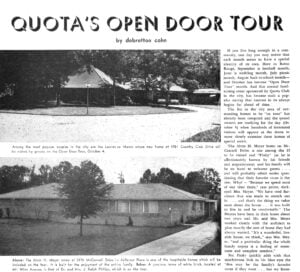Long Story Short: Yardi-Gras
In south Louisiana, we are sturdy people. Don’t let anybody tell you different. We might not have crossed the plains and mountains in search of a new frontier, but we’ve survived hurricanes, waded through floodwaters, and ingested enough bad politics that our innards are just as strong as our exterior. To loosely paraphrase the Good Book, we’ve walked through the valley of the shadow of death—we bought T-shirts—and we fear no evil.
That’s why when the worldwide surge of the pandemic hit hard in 2020, the Louisiana folks didn’t really know what to do except stock up on water and toilet paper. Because stocking up and getting prepared are some of the things we do best. Then we ride out the storm while watching the news and the weather 24/7. Then we rally together and help one another.
I think we’ve watched enough news for now, haven’t we?
But the rallying together and helping one another is one piece of the puzzle we do exceptionally well. We board up houses; we bring food; we distribute blue tarps. Louisiana people take pride in providing for one another.
So when the city of New Orleans canceled Carnival parades in 2021—Mardi Gras is a $1 billion industry for the area—there were more than a few people sidelined in an industry. Specifically, the artists and builders of the floats.
These workers weren’t top of mind when Megan Boudreaux, a 38-year-old insurance claims manager, produced a “Krewe of House Floats” Facebook page suggesting that her Algiers Point neighbors join her in decorating their porches as float substitutes. She just wanted to show some community cheer in the wake of disappointing news. Within 10 days, the Krewe of House Floats page had 5,000 followers, and 39 neighborhood “subkrewes” popped up with separate themes. As word spread, Krewe of Red Beans founder Devin de Wulf agreed to manage a project conceived by artist Caroline Thomas—of Royal Artists float building company—to pay float builders to produce house floats for homes and businesses. Through the “Hire a Mardi Gras Artist” program, the team produced 23 of New Orleans’ most striking custom-designed house floats at a cost of roughly $15,000 each (Commander’s Palace and IberiaBank were adorned with their designs). When Rene Pierre, owner of Crescent City Artists, posted his company’s services on the Krewe of House Floats Facebook page, he received 30 commissions for house floats in the first three days. He and his staff produced 64 canvas and wood custom designs that sold for an average of $1,500 each.
“I think for the first time, the world was introduced to the workers of Mardi Gras who are often so behind the scenes that they don’t get the appreciation they deserve,” says Thomas in the Porches on Parade book created by The Advocate and nola.com. “They got to be rock stars this year, and that’s awesome.”
Nearly 1,000 homeowners are participating in the house float craze in 2022, whether parades are rolling or not. It’s a movement that saved an industry and established a new tradition being adopted worldwide (reports are that Louisiana loyalists are decorating their houses like parade floats as far away as Mozambique).
Time to buy the T-shirt.










